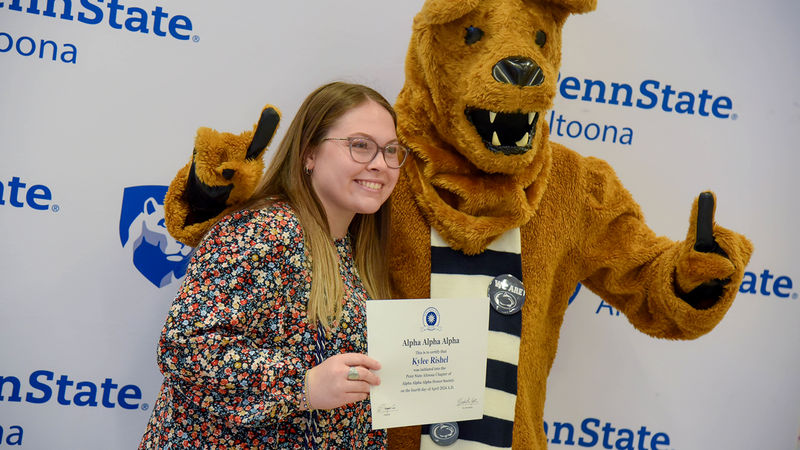

This dialog contains the full navigation menu for this site.

It’s sometimes tough to be the first: the firstborn, the first of your friends to jump off the high dive at the community pool, the first to invent something or the first to share a novel idea or discovery.
Being the first in a family to attend college can also be hard, with issues specific only to them.
A first-generation college student is typically defined as one whose parents or guardians did not complete a four-year college or university degree. According to Penn State statistics, about 25% of the University’s undergraduate student population at University Park and the Commonwealth Campuses combined are first-generation. Approximately 37% of the students at Penn State Altoona are first-generation.
These students are part of a demographic with unique challenges, such as lack of parental guidance, financial pressures and debt, college readiness, and lack of awareness about campus resources. These can lead to isolation and marginalization, often leaving students feeling invisible, like they don’t fit in or like they aren’t good enough for college.
Recognizing the importance of helping first-generation students navigate the college experience, supporting them through challenges, and celebrating their successes, Penn State Altoona chartered membership of Alpha Alpha Alpha, or Tri-Alpha, Honor Society in the fall of 2023 and became the Theta Chi Chapter.
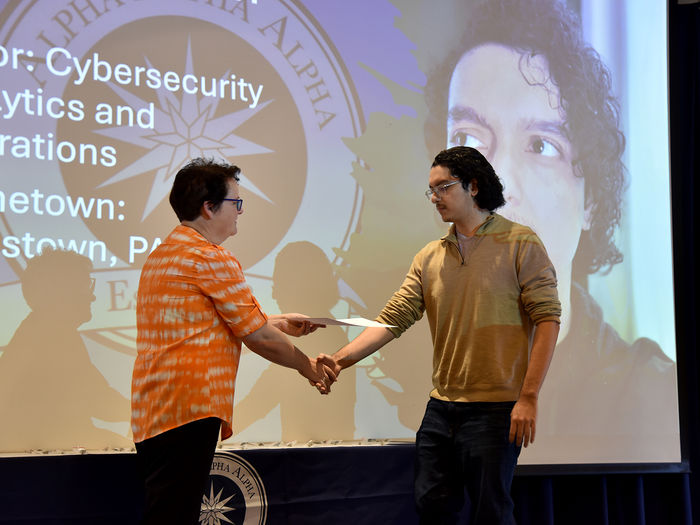
Hans Esteban, cybersecurity analytics and operations major, accepts his certificate and pin at the induction ceremony.
Tri-Alpha, founded in 2018, is the nation’s only honor society for first-gen students. Theta Chi is the fourth Tri-Alpha chapter at Penn State: Penn State Abington and Penn State Lehigh Valley previously installed their chapters, and University Park launched its own this year.
On April 5, 43 Penn State Altoona students, faculty, and staff were the first inductees into the college’s chapter.
“First-gen students bring many unique perspectives and skills to our campus that make us stronger,” says Sue Patterson, director of Diversity, Equity, Inclusion, and Belonging. “Achieving this level of academic success when you are a member of the first-gen population is notable and should be honored.”
“It’s pretty prestigious to me,” says Sara Hyde, a first-gen, environmental studies student. “My family has struggled, but they paved the way for me to be able to do this, and now we can celebrate that.”
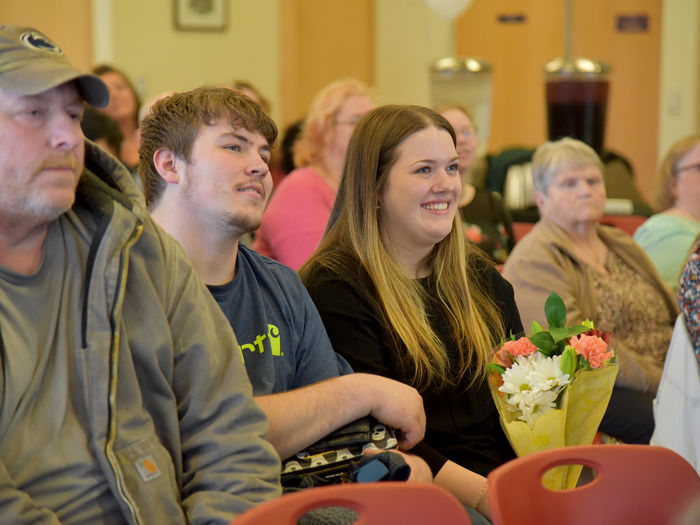
Anisa Miller, an Altoona native and psychology major, listens to remarks during the induction ceremony.
Getting into college is one success for first-gens—staying there is another. Barriers include navigating scholarship and financial aid and balancing full- or part-time jobs and family obligations on top of credit loads. When things get tough, money dries up, or when it seems as though a degree isn’t worth the hassle, Tri-Alpha faculty and staff can step in as mentors and support systems.
“I believe faculty visibility is critically important for these students,” says Lara La Dage, associate professor of biology, a first-generation student herself, and Tri-Alpha member. “I belong to several underrepresented groups in higher education so I am keenly aware of the importance of visibility, and how self-identifying can serve as an anchor for students who share similar demographics.”
La Dage goes on to say these faculty and staff mentors can normalize the experiences of Penn State Altoona’s first-generation college students. They can foster a community where first-gens feel seen and understood, make connections, and build a network of those dedicated to first-gen success.
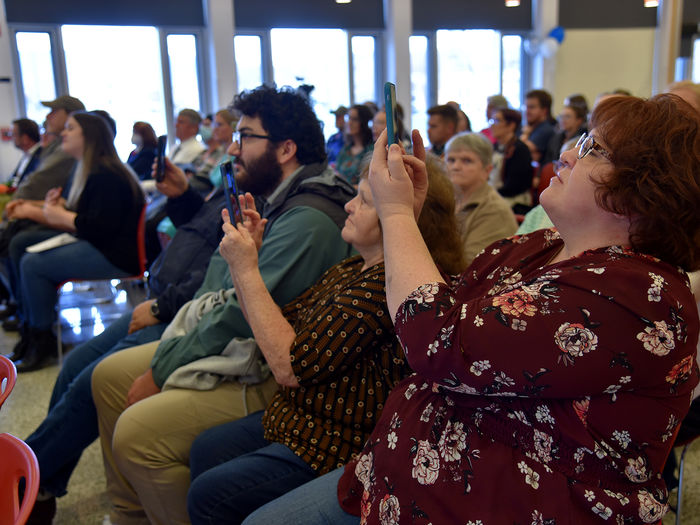
Proud families support their sons and daughters during the induction ceremony.
Erin Shumac, a student success advocate at Penn State Altoona, was excited to learn about and join Tri-Alpha. She says she saw it as a wonderful opportunity to highlight the first-gen identity in a positive light and provided opportunities to collaborate, aspire, and celebrate with likeminded individuals.
“I'd be honored for students to see me as someone who is approachable and committed to traveling on their educational journey with them as long as they'd need or like. By having intentional communication with our first-gen students, we can get to know their unique challenges, nourish their gifts and talents, and sincerely applaud their accomplishments.”
Dr. Ron Darbeau, Penn State Altoona chancellor, was inducted into the society himself, but also addressed other inductees, specifically students. He pointed out that being aTri-Alpha member is more than something to put on a resume later: it identifies them to potential employers and other professionals as people of superior academic ability and commitment.
“Do not underestimate the importance of this on your life. A college degree opens doors, and when those doors are stubborn, a college degree will knock them down. What you do, you do for yourself, but by God, there are troves of people waiting to be inspired by you. What you do matters.”
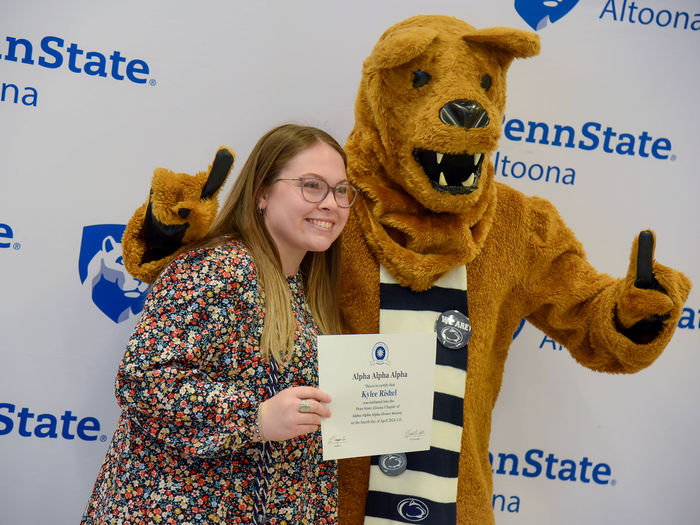
Psychology major Kylee Rishel poses with her certificate and the Nittany Lion after the induction ceremony.
That message hit home for Jadie Pensyl, a senior majoring in communications with a minor in entrepreneurship. One of the biggest motivators for going to and getting through college is her younger sister. “Coming from a family where no one went to college and the passing of my mother, I really thought I could be a good role model for my little sister by going to college and setting the standards. I think I have because she says she wants to go to college, and she’s only 14. It’s wonderful to see that I’ve been a good influence on her.”
Sierra Snigier graduated from Penn State Altoona in 2020, the first in her family to earn a college degree. She currently works as a marketing assistant in her hometown city of Seaford, Delaware.
She encourages her fellow first-gens to get involved in campus clubs and organizations that can lead to a world of networking, scholarships, internships, and opportunities.
But above all, “Be proud you’re there. You have an impact.”
“This is a tough road to hoe,” Darbeau told students at the induction ceremony. “It takes a lot to be first and not a single one of you is devoid of the mind set or skill to do this and do it well. You are not alone, and we will remind you of the power and the potency you have. I am proud of each and every one of you for being brave enough, being inspired enough to walk this journey.”
Penn State Altoona will open membership to alumni beginning this fall, and induction ceremonies will be held each semester.
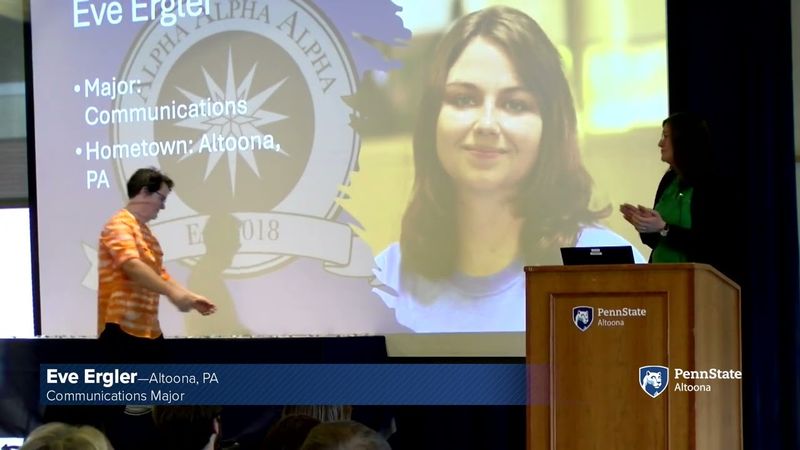
On Thursday, April 4, Penn State Altoona hosted the inaugural induction ceremony of the Theta Chi chapter of Alpha Alpha Alpha, an honor society for first-generation college students.


